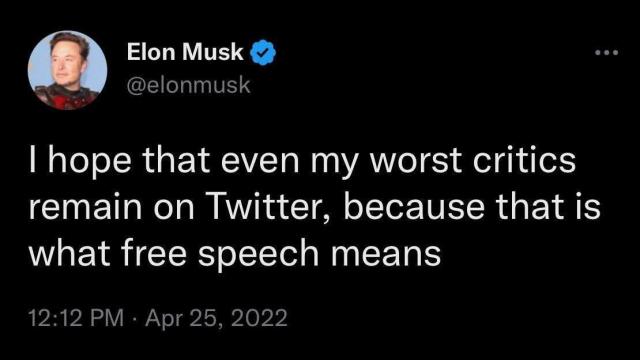Twitter’s locking the hatches to keep users from jumping off its sinking ship.
Late Thursday evening the site reportedly began blocking links to popular servers at Mastodon, Twitter’s emerging competitor. Twitter also suspended Mastodon’s official Twitter page. The blocks occurred just hours after Twitter began purging the accounts of prominent journalists who’ve written critically about owner Elon Musk in the past.
NEW: Twitter suspended competitor #Mastodon‘s account.
This is going to get worse. pic.twitter.com/Gp2L49tPgh
— John Scott-Railton (@jsrailton) December 16, 2022
Users who try to rapidly tweet out Mastodon links will reportedly receive an error message from Twitter saying it, “cannot complete this request because this link has been identified by Twitter as being potentially harmful.” The Verge says, according to its testing, Twitter appears to be blocking links out to the original mastodon.social server and at least 10 other domains.
mastodon links won’t tweet at all now pic.twitter.com/uo8EiM1wRH
— Taylor Hatmaker (@tayhatmaker) December 16, 2022
Anyone who has spent even a few moments on Twitter over the past month have probably seen some Mastodon links trickle into their feeds. The Twitter-alternative, previously a small, relatively niche service, claims it drew in nearly half a million users in the first two weeks after Musk took over the helm at Twitter. Researchers, activists, journalists, and an assortment of other disaffected Twitter users fled to the platform after Musk, well, basically turned Twitter into the very “free-for-all hellscape,” he said he wanted to avoid. Some Twitter users worked to creatively dance around the link bans on Friday by adding a Mastodon profile link to their account name or bios.
Twitter did not respond to Gizmodo’s request for comment about the Mastodon blocks, though it’s worth noting Twitter’s communications team reportedly endured major cuts as part of the company’s estimated 3,700 personal layoffs.
Mastodon’s official account appears to have gotten the boot shortly after it posted a Mastodon link related to the now banned ElonJet account. That account, which tracked the location of Musk’s private jet, was suspended from Twitter this week, then reinstated, and then suspended again for allegedly violating Twitter’s rules. While it’s unclear what actual Twitter rules ElonJet violated, Musk took to Twitter to say “Real-time posting of someone else’s location violates doxxing policy.” Twitter also suspended the ElonJet’s creator, a 20-year-old college student named Jack Sweeney. Musk had previously tried to pay Sweeney $US5,000 ($6,941) to voluntarily remove the account.
The Twitter purge didn’t stop with ElonJet though. On Thursday Twitter banned the account of at least nine prominent journalists, most of which had previously written articles critical of Musk. While it’s unclear exactly why those accounts were permanently suspended, all of them appear to have tweeted about the ElonJet account.
Musk appeared to address some of the bans in a series of tweets.
“If anyone posted real-time locations & addresses of NYT reporters, FBI would be investigating, there’d be hearings on Capitol Hill & Biden would give speeches about end of democracy!” Musk wrote. In a separate tweet, the billionaire said, “Criticising me all day long is totally fine, but doxxing my real-time location and endangering my family is not.”
Musk then went on to create one of his now all too familiar polls, apparently leaving it up to Twitter’s increasingly vitriolic user base to decide whether or not to reinstate members of the press. At the time of writing, 43% of respondents said Twitter should reinstate the accounts immediately. 14.4% said the ban should continue for seven more days while 38.1% simply said the bans should continue, “longer.” Musk deployed a similarly “scientific” approach to decide whether or not to reinstate former president Donald Trump’s account.
Sorry, too many options. Will redo poll.
— Elon Musk (@elonmusk) December 16, 2022
If that wasn’t all already weird enough, Musk apparently joined a Twitter spaces event with the banned journalist after they discovered a workaround that let banned accounts join the social audio feature. During the call, Musk tried to explain his rationale for the petty bans before abruptly leaving the meeting.
“As I’m sure everyone who’s been doxxed would agree, drawing real-time information about somebody’s location is inappropriate and I think everyone on this call would not like that to be done to them,” Musk said. “And there’s not going to be any distinction in the future between journalists, so-called journalists, and regular people. Everyone’s going to be treated the same.”
Not long after that call Twitter disabled its Spaces feature. It’s unclear for now if it will ever return.
